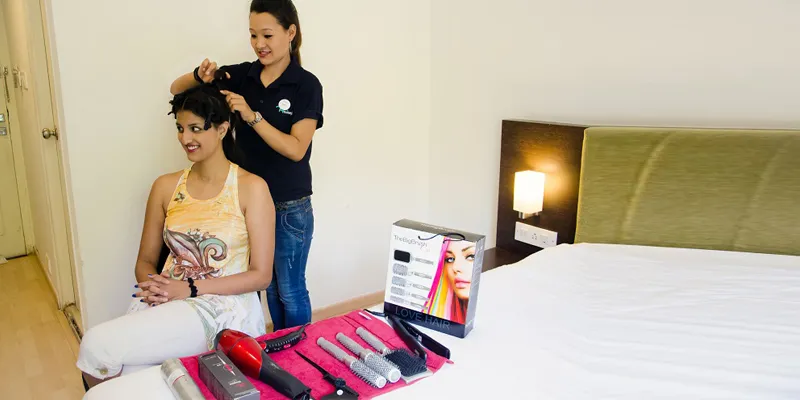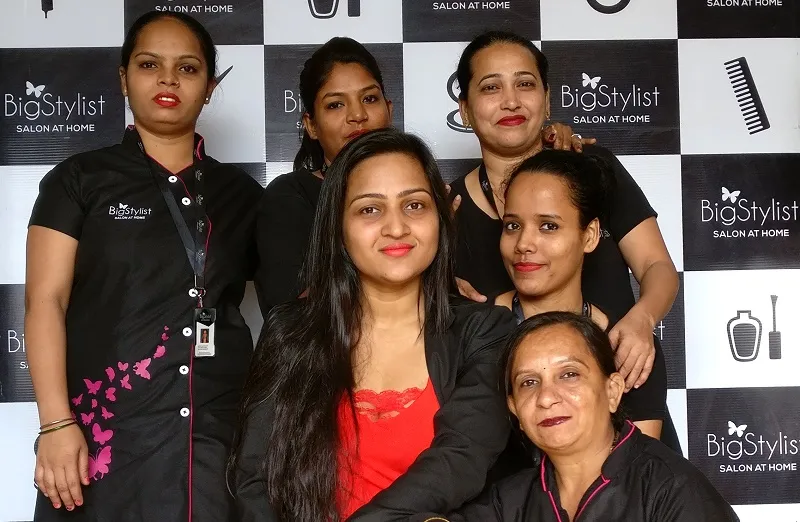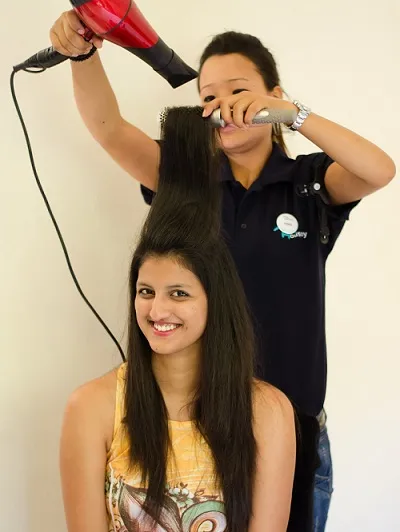How these 2 beauty services startups are also changing the lives of beauty experts
Hyperlocal beauty services startups not only make your life more convenient but they offer attractive work options to women in the blue-collar segment.
The dotcom boom has been a boon to e-commerce players and food delivery boys, many of whom are first-time owners of two-wheelers and earning a decent earning, which, in many cases, is double or triple the money they would make earlier. The online beauty services industry, which provides parlour services to Indian women, has opened up a further extension of this job market, almost exclusively to women. Many of the brick-and-mortar options in the beauty industry are standalone stores, which scrimp on salaries and insist on rigid, long work hours. YourStory spoke to few of the women who have joined the hyperlocal startups in the beauty space to understand how their lives have changed after joining this segment.

Mumbai-based Vasanti Soni, a trained beautician and stay-at-home single mother, could not get her child operated because of lack of funds. She had worked with a parlour in Goregaon for over ten years before taking a break and so tried getting a job at several beauty salons, but the salary offered wasn’t enough to run the household as well as save to pay for the operation. Six months ago, Vasanti joined BigStylist.com and earns double the income that a regular salon job would get her, at nearly Rs 20,000 per month. Recently, her child was successfully operated and has now recovered.
Styling by BigStylist
Richa Singh co-founded BigStylist.com in May 2015 along with Chinmaya Sharma and Anurag Srivastava, her batchmates at IIT Kharagpur. Richa says, "When I moved to Kharagpur, I was very disappointed by the quality of service provided by local beauty parlours or salons. The service was so bad that many times, many of us IIT girls travelled to Kolkata for our basic grooming needs, which was a major hassle during hectic academic sessions. I continued to face this problem as I moved to a different city for my MBA, at IIM Ahmedabad, and later when I started traveling to different South-east Asian countries during my consulting stint with Oliver Wyman.”
After completing his MBA from IIM Bangalore, Chinmaya worked for four years in a consulting role at Bain & Company. Anurag worked at ADP, a Fortune 500 payroll management company, in Hyderabad and New Jersey.

BigStylist.com is an 'Internet salon' offering beauty and salon services to clients in the comfort of their homes. The startup currently offers its services across Mumbai, Navi Mumbai, and Pune. One of the biggest concerns for customers is the consistency in quality of service across all areas of operations. BigStylist.com has addressed this concern by carefully handpicking the stylists and verifying their credentials and providing them with quality training. Customers can avail beauty services on BigStylist.com through their website, mobile app or WhatsApp.
Once a beauty expert joins the BigStylist team, she undergoes dedicated five days of training consisting of theoretical and practical learning. The beauty experts are given soft skills training so that they can interact well with customers. They are also taught to use smartphones and the BigStylist app as that is the primary mode of communication.
The employees are compensated based on their skill set through different incentive models. Varsha Bhoir, another service provider at the startup, says:
After I joined BigStylist, I enjoy more flexibility in my work, and therefore I have a better work–life balance. I can accept appointments depending on my convenience. If I have personal commitments, I take up less number of appointments.
Richa says, “Given our ‘work-from- home’ ethos, we end up working with a lot of girls and women who are trained and have worked in the past but were not working when we met them. In that regard, we are significantly empowering the women employees in our team.”
Richa is quick to emphasise on the emphasis placed on the safety of their staff. She explains, “We do not provide cross-gender (male customers’ request for female beauty experts and vice versa) services.”
When the Beauty Experts reaches the customer’s residence, they don’t enter until the female customer comes to receive them at the door. The team can also tracks the experts using the apps installed on their phones. BigStylist also has a dedicated helpline number for the staff to dial in case of emergency. There are totally 150 women working for BigStylist in Mumbai and Pune.
The startup has raised around $2 million from Info Edge in two separate rounds (November 2015 and September 2016), which they are using to further expand their reach in Pune and Mumbai. They are already operationally profitable and hope to turn net profitable in these two cities soon. The team is also looking to expand into Delhi NCR and Hyderabad.
Stay home, thanks to Housejoy
Housejoy, launched in January 2015, is primarily known for providing aggregation of home cleaning and maintenance services to customers. Founded by Sunil Goel and Arjun Kumar, Housejoy raised Rs 150 crore in Series B round of funding in December 2015. Housejoy offers specialised services in beauty and in-house bridal make-up as part of their service portfolio. Their best city in terms of revenue is Bengaluru, closely followed by Delhi and Mumbai.

Saran Chatterjee, CEO, Housejoy says, “Our service providers get 30 percent more salary than regular brick and mortar stores along with additional incentive of up to Rs 6,000 per month. We also offer other incentives like PF and insurance.” All the service providers have bank accounts, thereby having lesser cash dependencies and are educated in financial planning and schemes.
The beauticians are inducted with training sessions to bring them up to par with the brand standards. They get an ID card and neat uniforms which help them see a behaviour change in customers, and they feel they get treated with a lot more respect. Training workshops are carried out once every three to six months to ensure technical training as well process training is an ongoing process and becomes second nature to the staff. Technology literacy has improved and the women now are able to access mails and use smartphones.
The women are also provided soft skills training and develop confidence while interacting with customers.
Shilpa Bharani, who has been with Housejoy for more than two years, says:
Off sites help us in terms of interaction as well as general motivation. Also, compared to brick and mortar parlours, where we barely had a day off, now we can pick and choose appointments based on our convenience which brings good work–life balance.
Housejoy ensures safety of their staff through the panic button on the app. On pressing the panic button, an SMS is immediately sent to three friends or family members and two Housejoy team members.
If the beautician has a bad customer experience, the startup cancels the job and blocks the consumer permanently. The beauticians are encouraged to use Ola and Uber and the last job is scheduled at 6 pm.
Other players
Multi-city services provider Urbanclap, Vanitycube in Delhi NCR and Mumbai, and BulBul in Chandigarh are other players in this industry. Along with food and health, beauty services are one of the areas on which people (especially women) spend regularly. On an average, the urban Indian woman spends anywhere between Rs 1,000 and Rs 4,000 on a monthly basis on basic beauty rituals.
In a large economy like India, the market size for beauty services is pegged at around $5 billion and it’s growing fast.







